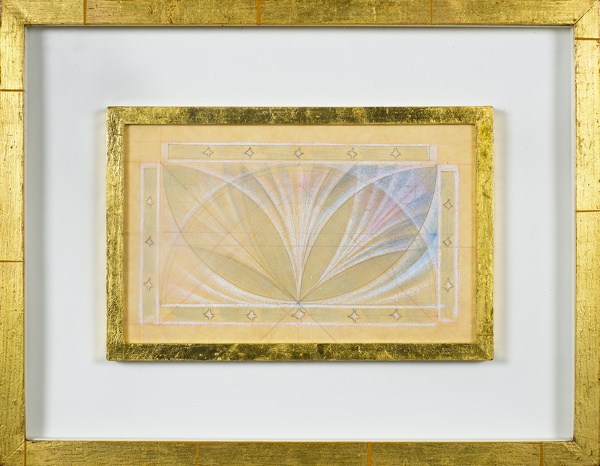
 SOLD
SOLD
Sir Thomas Monnington:
Untitled, circa 1953
Framed (ref: 5417)
Chalk and pencil on tracing paper, 6 1/4 x 4 in. (16 x 10 cm.)
Tags: Sir Thomas Monnington chalk pencil
Provenance: The Artist's Family
In a gilded frame set onto a white gesso board with gilded outer moulding, glazed.
This
'geometric' drawing dates to the early 1950's when Monnington was
working on the ceiling design for the Bristol Council House. The New
Bristol Council House, designed by Vincent Harris, was built in
the early 1950s. Monnington was commissioned to paint the ceiling in
1953; it was unveiled in 1956. The ceiling, measuring 95 x 45 feet (over
4000 square feet), is amongst the largest post-war decorative schemes
in Europe. Monnington insisted on painting in the Renaissance manner -
directly onto wet plaster. The colours were ground and mixed with an
emulsion of eggs, chalk and water - Bristol's Clerk of the Works
delivered baskets of eggs daily.
'A suggestion by the Bristol
city fathers that the subject should be "something connected with the
Merchant Adventurers" fell on deaf ears. Monnington determined that his
design should instead commemorate those scientific achievements which
future Bristolians would associate with the mid-twentieth century, and
which he himself had become excited by over the last twenty years:
modern nuclear physics; electronics, which had enthralled him first in
the shape of radio masts and later in radar equipment; aeronautics,
whose laws he had begun to comprehend during the war; and biochemistry,
where enlarged photographs of recent research revealed amazing
quasi-abstract patterns.' Judy Egerton, Monnington, Royal Academy, 1977,
p. 13.
Monnington's design bears similarities to the paintings
of the Italian futurist Balla, but is underwritten by his deep
admiration for Piero della Francesca, constructed as it is along the
lines of the Golden Section. There are also stylistic similarities with
the sculptures of Monnington's neighbour, Professor Gerrard. A number of
drawings by Monnington for the ceiling are in the collection of the
Victoria and Albert Museum, The Science Museum and Bristol City Art
Gallery.







